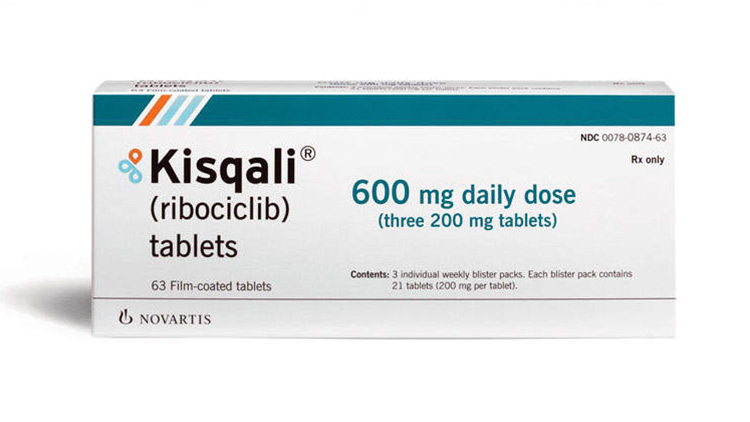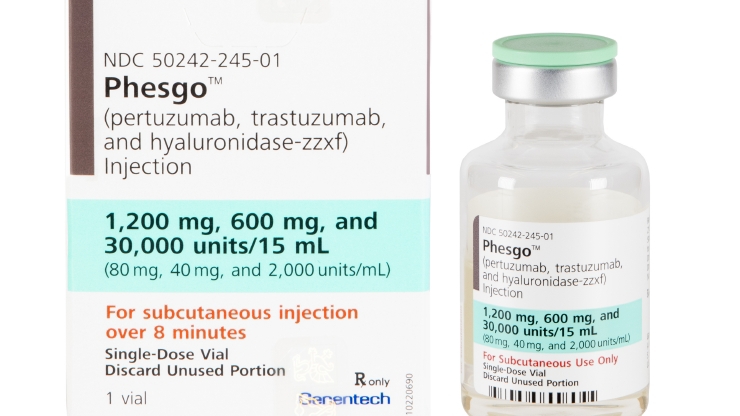Kisqali (ribociclib) vs Phesgo (pertuzumab, trastuzumab, and hyaluronidase)
Kisqali (ribociclib) vs Phesgo (pertuzumab, trastuzumab, and hyaluronidase)
Kisqali (ribociclib) is a CDK4/6 inhibitor used in combination with an aromatase inhibitor for the treatment of HR-positive, HER2-negative advanced or metastatic breast cancer in postmenopausal women. Phesgo combines pertuzumab and trastuzumab, two monoclonal antibodies targeting the HER2 receptor, with hyaluronidase, an enzyme that increases tissue permeability, and is used for treating HER2-positive breast cancer in an injectable form. The choice between Kisqali and Phesgo would depend on the breast cancer's hormone receptor and HER2 status: Kisqali is appropriate for HR-positive, HER2-negative cases, while Phesgo is indicated for HER2-positive breast cancers, regardless of hormone receptor status.
Difference between Kisqali and Phesgo
| Metric | Kisqali (ribociclib) | Phesgo (pertuzumab, trastuzumab, and hyaluronidase) |
|---|---|---|
| Generic name | Ribociclib | Pertuzumab, Trastuzumab, and Hyaluronidase-zzxf |
| Indications | HR-positive, HER2-negative advanced or metastatic breast cancer | HER2-positive breast cancer |
| Mechanism of action | CDK4/6 inhibitor | HER2 receptor antagonist & enzyme |
| Brand names | Kisqali | Phesgo |
| Administrative route | Oral | Subcutaneous injection |
| Side effects | Neutropenia, nausea, infections, fatigue, diarrhea | Diarrhea, alopecia, nausea, neutropenia, fatigue |
| Contraindications | QT prolongation, liver impairment, hypersensitivity to ribociclib | Hypersensitivity to active substances or excipients |
| Drug class | Antineoplastic agent | Antineoplastic combination |
| Manufacturer | Novartis Pharmaceuticals | Genentech, Inc. |
Efficacy
Kisqali (Ribociclib) for Breast Cancer
Kisqali (ribociclib) is a targeted therapy used in the treatment of certain types of breast cancer. Specifically, it is approved for use in combination with an aromatase inhibitor for the treatment of pre/perimenopausal or postmenopausal women with hormone receptor-positive, human epidermal growth factor receptor 2-negative (HR+/HER2-) advanced or metastatic breast cancer. Ribociclib is a cyclin-dependent kinase inhibitor (CDK4/6 inhibitor) that works by inhibiting proteins which are involved in the proliferation of cancer cells. Clinical trials have shown that Kisqali, when used in combination with an aromatase inhibitor or fulvestrant, can significantly improve progression-free survival in patients with this type of breast cancer.
Phesgo (Pertuzumab, Trastuzumab, and Hyaluronidase) for Breast Cancer
Phesgo is a combination of two monoclonal antibodies, pertuzumab and trastuzumab, with the enzyme hyaluronidase, used for the treatment of HER2-positive breast cancer. This combination is designed for subcutaneous injection, offering a more convenient administration compared to the intravenous formulations of pertuzumab and trastuzumab. Pertuzumab and trastuzumab target the HER2 protein, which is overexpressed in some breast cancer cells, leading to the inhibition of cancer cell growth and survival. The addition of hyaluronidase increases the dispersion and absorption of the drugs. Phesgo has been shown to be effective in improving survival rates and reducing the risk of disease progression or death when used in combination with chemotherapy for the treatment of early and metastatic HER2-positive breast cancer.
Comparative Efficacy in Clinical Settings
When comparing the efficacy of Kisqali and Phesgo, it is important to note that they target different subtypes of breast cancer and are not directly comparable. Kisqali is used for HR+/HER2- breast cancer, while Phesgo is indicated for HER2-positive cases. Both have been shown to be effective in their respective indications and have improved outcomes for patients. The efficacy of these drugs has been demonstrated in large, randomized clinical trials, which have served as the basis for their approval by regulatory agencies such as the FDA.
Conclusion
In summary, Kisqali and Phesgo are important components of breast cancer treatment regimens for their respective indications. Kisqali's role in inhibiting CDK4/6 provides a valuable tool in the management of HR+/HER2- advanced or metastatic breast cancer, while Phesgo offers a convenient and effective treatment option for patients with HER2-positive breast cancer. Both medications have been associated with improved clinical outcomes, underscoring the importance of targeted therapies in the fight against breast cancer.
Regulatory Agency Approvals
Kisqali
-
European Medical Agency (EMA), European Union

-
Food and Drug Administration (FDA), USA

-
Health Canada

-
Therapeutic Goods Administration (TGA), Australia

-
Medsafe (NZ)

Phesgo
-
European Medical Agency (EMA), European Union

-
Food and Drug Administration (FDA), USA

Access Kisqali or Phesgo today
If Kisqali or Phesgo are not approved or available in your country (e.g. due to supply issues), you can access them via Everyone.org.
How it works

Make an enquiry
Choose the medicine you want to buy, answer a couple of questions, and upload your prescription to speed things up. We’ll get back to you within 24 hours.


Make an enquiry
Choose the medicine you want to buy, answer a couple of questions, and upload your prescription to speed things up. We’ll get back to you within 24 hours.


Breeze through the paperwork
We'll guide you through the required documents for importing unapproved medicine, ensuring you have all the necessary information.


Get a personalized quote
We’ll prepare a quote for you, including medicine costs and any shipping, administrative, or import fees that may apply.


Receive your medicine
Accept the quote and we’ll handle the rest - sourcing and safely delivering your medicine.

Some text on this page has been automatically generated. Speak to your physician before you start a new treatment or medication.
Let's talk
If you have any questions, call us or send us a message through WhatsApp or email:
Contact us




